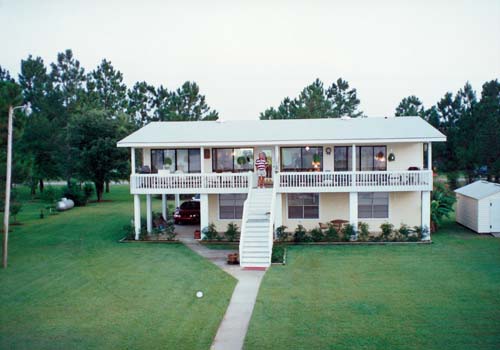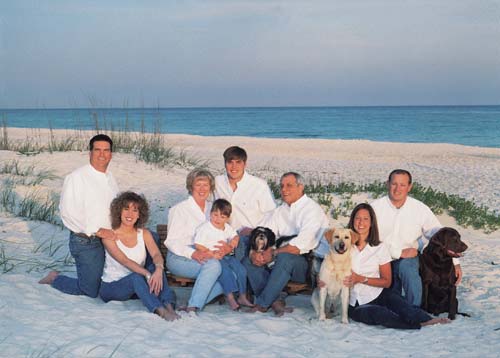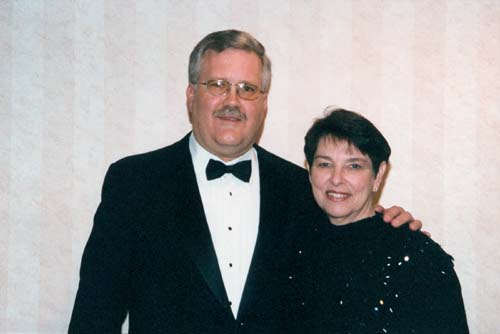Don McCrory, president of Kiker Corp., Mobile, Ala., loves offshore fishing. And McCrory believes he can best describe his goal for his NRCA presidency in nautical terms. Simply, he wants to be a good captain.
"When the seas get rough, I have to make sure NRCA can ride with them until things calm down," McCrory explains. "I have to do what I have to do to keep things moving forward."
Although NRCA responsibilities may cut into McCrory's fishing time, he says he is humbled and honored to be the 2002-03 president. He knows he is following a long line of tremendous presidents with whom he is proud to join ranks.
"Past presidents have been good leaders and contributed positive things," McCrory adds. "And I hope to continue that tradition."
Industry roots
McCrory's involvement in the roofing industry started in 1965 when, at the age of 21, he took a sales position with GAF Materials Corp., Wayne, N.J. McCrory briefly left the company to marry his wife, Sandra, and finish college at the University of South Alabama, Mobile. After graduating, McCrory returned to GAF for six years.
In 1975, he started a residential roofing company in Mobile that was plagued with problems. In 1979, McCrory decided to turn the company into a family business. McCrory asked his younger brother, Bruce, Kiker's general manager, to help him form a commercial roofing company. That year, Kiker Corp. was established and named after their father, William Kiker McCrory.
McCrory adds: "Bruce came up with the name. He said, ‘Let's name it after daddy.'"
Kiker performs 40 percent built-up roofing work, 50 percent modified bitumen work and 10 percent single-ply work. The company is licensed in Alabama, Florida, Georgia, Louisiana and Mississippi.
As Bruce was pulled into the company, so was his wife, Patricia, Kiker's controller. They joke that they joined the company temporarily to help and planned to move to other careers—they just never left.
McCrory's oldest daughter, Melissa Rayborn, performed clerical work for the company during summers when she was a teenager and 1990-91 while attending college part time. After working for Kiker for one year, Rayborn went back to college full time and chose not to work for the company after graduation.
In 1996, the McCrory clan brought another family member aboard—McCrory's daughter Paige Yance, now a Kiker estimator. Yance had been working for an advertising firm after graduating from Auburn University, Montgomery, Ala. She attended an NRCA Midyear Meeting in Chicago with McCrory and, according to Sandra, was impressed with the association and its members and wanted to get involved. Although McCrory was pleased Yance wanted to join the business, he says the decision surprised him and he feared the work would not suit her.
"I honestly thought Paige wouldn't last because the industry is so male-dominated," McCrory says. "But I was so fooled and wrong, and I am glad I was."
Despite Kiker being a family business, nonfamily employees feel equally welcome and rejoice in McCrory's success.
"I am crazy about him," says Kathy Richardson, a Kiker estimator. "Don pushes people to achieve what they can and sees things in them they may not see in themselves."
One reason McCrory and Bruce have built a successful business is because of McCrory's innate ability to sell. Rayborn teases that her dad could sell beach-front property in Arizona. Much to the disturbance of Yance, he often walks around the office saying, "Sell something" or "Did you sell something?"
McCrory believes his sales abilities will benefit NRCA. "I will be able to communicate NRCA's ideas and attributes … to get across to the industry how strong an organization it is and how important a role it can play."
Getting involved
In 1980, Kiker became an NRCA member. And McCrory didn't wait long to become involved with the association. In 1985, he became a member of the Public Relations Committee; he chaired the committee in 1991-92 and 1993-94. He also chaired the Environmental Action Task Force, Membership Committee, Consumer Awareness Committee, Roofing Awareness Program Task Force, Industry Advisory Board, Budget and Finance Committee, Exhibitor Advisory Committee and PAC Advisory Committee. In addition, McCrory was an NRCA director during 1986-89 and 1991-94; officer during 1990-91, 1996-98 and 1999-2000; and vice president from 1999-2002.
McCrory teases, "They sent me back to the Executive Committee three times until they knew I got it right."
McCrory believes one of his greatest NRCA accomplishments was helping develop ROOFPAC, NRCA's political action committee, and the association's Washington, D.C., office. McCrory was involved in ROOFPAC's first raffle, golf tournament and auction.
In addition to NRCA, McCrory is involved in other roofing organizations. These include the Alabama Roofing, Sheet Metal, Heating & Air Conditioning Contractors Association; Roof Consultants Institute; and South Alabama Roofing Association, for which he served as president.
Agenda
As an NRCA leader, McCrory has addressed some serious issues, and he believes he will face more during his presidency. These include tough economic times, increasing petroleum and asphalt prices, an insurance crisis and work force shortages. Kenny Spence, Kiker's general superintendent, believes McCrory is the person to address these issues.
Spence says, "If there is something to be done, Don knows how to get people to do it."
McCrory believes the economy will be an issue because it is on everyone's mind—including his. Kiker has been facing a slowdown for two years that has greatly affected the company. According to McCrory, Kiker staff members voluntarily took pay cuts to help. As president, McCrory plans to provide information to NRCA members about how to manage an economic downturn.
McCrory also thinks petroleum and asphalt prices are another problem to watch. He says he has learned in recent NRCA meetings that roofing professionals most likely will face escalating prices in the asphalt industry because of supply distributions and new regulations for oil refineries.
In addition, NRCA has been receiving feedback from contractors concerned about insurance costs and the inability to find insurance. NRCA recently warned its members that significant price increases in all lines of insurance coverage are occurring.
"Distributors, manufacturers and other people I have talked with are more concerned about insurance for the commercial roofing market than the residential market," McCrory adds.
McCrory says in his area, most residential contractors don't have insurance because it is not required by state law.
Although the work force issue has taken a back seat to economic-related issues, McCrory says NRCA will have to revisit the work force shortage when the economy recovers. To help improve employee retention problems, McCrory believes NRCA must better inform contractors about its programs and services, such as its worker training videos. But the decision to improve the work force belongs to contractors.
"I think contractors [will have to] make a commitment to address the problem," McCrory notes. "NRCA has to provide the tools to do that, but I don't think it can make contractors commit."
Despite pressing concerns, McCrory says he has seen positive changes in the roofing industry. He believes the industry has become more professional and taken noteworthy steps to improve its image. A change he would like to see is improved relations between contractors, architects, building owners and manufacturers.
NRCA also has bloomed since McCrory became involved. Total membership has grown, and, according to McCrory, the association has become a leader in the construction industry. He also has seen the number of people who want to get involved with the association increase.
"We are fortunate so many people want to get involved in NRCA's leadership and board of directors," McCrory says. "I would like to see committees expand so we can get these people involved, especially young people."
As NRCA's leadership expands, McCrory also would like to see its membership profile grow. He believes the association needs to incorporate a larger segment of the industry, particularly those in the distribution sector.
The telephone
Making a commitment to be part of NRCA's leadership means spending less time with one's family and business. But McCrory's increased travel responsibilities don't seem to faze anyone. His family members, in fact, are used to not seeing McCrory on weekends unless they accompany him on an outdoor adventure. Most weekends, McCrory is offshore fishing for marlin or hunting deer or turkey at his cabin in Monroe County, Ala.
Kiker staff members are equally prepared for McCrory's trips. Richardson jokes that she already has asked for McCrory's parking spot and employees threaten to move him out of his office during an NRCA trip so Yance can have it. But Yance knows that even when her father is traveling, she can contact him.
"I miss him when I walk around the office, but [traveling] hasn't hurt the business," Yance adds. "He is a telephone call or e-mail away."
And McCrory is more than happy to talk on the telephone. McCrory says his constant conversations are ways to sell his company's services and stay connected with his customers.
"I love to get a new contact, work it through, and turn it into a lead and regular customer," McCrory says.
McCrory begins and ends each workday on the telephone during his 60-mile (97-km) drive to and from Kiker's office from his home in Orange Beach, Ala. He says the one-hour drive gives him time to check his planner, make appointments and make calls. McCrory has his commute so well-timed that he even monitors his speed to ensure he stops at the same three red lights every day to pour more coffee, which he carries in a thermos.

Photos courtesy of Don McCrory.
McCrory at his home in Orange Beach, Ala.
McCrory arrives at the office around 8:30 a.m. and checks his e-mail and voice mail. During the day, he continues to make telephone calls and estimates and visits job sites. He often has working lunches with customers.
After the drive home—during which he organizes tasks for the following day and makes more telephone calls—McCrory often gets to enjoy his prized possession, his boat, Southern Connection. The 38-foot- (11-m-) Blackfin Express boat is docked in his backyard lagoon that connects to the Gulf of Mexico. Southern Connection proves that a lot of hard work leads to rewards, but its name shows how NRCA influences McCrory's life.
McCrory explains: "My buddy Mike swore I was in the Chicago mafia because I traveled there so often for NRCA. He said to my brother-in-law, Kervin, ‘[Don] goes [to Chicago] just about every two months and must be bringing back money; he just bought a new boat.' Kervin looked at him and said, ‘Hell, yeah—he is the head of the southern connection of the mafia.' When I needed a name for my new boat, Paige said, ‘Daddy, how about southern connection?' And I said, ‘You got it!'"
The boat also is linked to NRCA by those who fish on it. Former NRCA President Bennett Hutchison III, president of Tip-Top Roofers Inc., Atlanta; Hutchison's son, Scott; McCrory; and McCrory's son-in-law Jack Rayborn, won the New Orleans Invitational Billfish Tournament on the Southern Connection. Prizes included cash, fishing tackle and the opportunity to compete with 21 other teams in the Rolex International in Hawaii.
Mellow fellow
Maybe all the fresh air McCrory has gotten over the years has subdued him. His family and friends agree he has mellowed during the past 10 years. McCrory's goal-oriented nature and drive to sell often made him hotheaded and react without thinking about consequences. McCrory admits the wisdom of age and recognizing he has a tendency to overreact has helped him control his temper.
Bruce notes: "Don is calmer. He has realized that some problems are not that important."
Being calm can be an asset when working in a family business. McCrory says he has to watch what he says but at times, that is hard to do.
"I think I tend to be a little tougher on my brother than somebody who just is a [business] partner," McCrory says. "I can say things to Bruce that I wouldn't say to another partner. But sometimes, it is the wrong thing to say."

McCrory as a child.
McCrory, who is five years older than Bruce, "aggravated the hell out of him" growing up. Bruce says as children they fought to the death—but they also worked well as a team. A favorite pastime for both is playing baseball; McCrory says if he wasn't a contractor, he would be a college baseball coach. As children, McCrory was a pitcher and Bruce a catcher. When talking about their lives now, Bruce realizes the irony of still being partners—like a pitcher and catcher.
In addition to being able to control his temper, McCrory has mastered the art of laughter. He often makes a morning telephone call to a friend to swap jokes; McCrory believes laughing is a great way to start the day. He also thinks laughing can make stressful situations calm. And being able to put people at ease with laughter is one of McCrory's greatest abilities.
For example, he explains: "We were in an intense [NRCA] Executive Committee meeting … and I could tell things were ready to explode. So I said, ‘Wait just a minute. I am just a poor, dumb Southern boy. I didn't have but one momma and one papa.' The whole room cracked up, and [NRCA Immediate Past President] Mike Promen [president of Clark Roofing Co., Broadview, Ill.] turned to me and said, ‘What does that mean?' And I said, ‘I didn't have but one momma and papa—I'm slow.'"
McCrory adds the offbeat comment changed the mood of the meeting and allowed participants to refocus.
Ladies' man
Growing up with one brother and working in a predominately male industry has not overshadowed the fact that, at home, McCrory is surrounded by strong, Southern women.
Sandra explains that early chance encounters prove she and McCrory were meant to be together—their mothers lived in the same boarding house and McCrory attended Sandra's 11th birthday party. Sandra and McCrory officially met in high school and started dating their senior year. In college, their romance dwindled and they broke up. They later were reunited while working at banks across the street from one another.
A testament to their 35-year marriage is the ability to raise two confident, independent and successful daughters, who tested McCrory's desire to stay calm.
Sandra says: "Don was strict with the girls. They knew not to mess with him. And if they didn't know, they learned quickly."
An emotional day for McCrory with his daughters was Yance's wedding day. While family members were getting dressed, Sandra broke the news to McCrory that Rayborn was in labor. Sandra says McCrory was so nervous and his hands were shaking so much that Jack had to button his shirt for him. Fortunately, Rayborn—and McCrory—made it through the ceremony and Rayborn had her son, Chandler, at 5 a.m. the next day.
Despite having a strong-minded father, Rayborn and Yance believe he couldn't have done a better job raising them. Rayborn believes her dad always leads with his heart. She jokes McCrory should have been a preacher because "he can preach until the day is done." In tune with Rayborn's thoughts, Yance adds a resounding "Amen, sister" to the comment.
"I don't think dad thought he was doing such a good job with us," Yance adds. "But he is a tremendous dad; he is a supportive, proud father. He now is more loving and free with saying ‘I love you.'"

Pictured from left to right: Jack and Melissa Rayborn; Sandra McCrory and grandson, Chandler Rayborn; Brandon Rayborn; McCrory; and Paige and Jimbo Yance.
In addition to being a doting father, McCrory is an equally loving grandfather. Chandler, who is 3 years old, quickly is joining in family traditions. Sandra says Chandler recently received a fishing pole and ran straight to his papa (what he calls McCrory) and said, "Can we go fishing, papa?" Sandra lovingly notes that after Chandler made his request, McCrory "looked as if he was going to melt into the floor."
"That child can do no wrong," Rayborn explains. "Dad loves him and is giving of his time. He teaches Chandler and is an active part in his life."
Nothing more
Sandra retired from a banking career last year, giving her more time to spend with her family and participate in activities she enjoys. She says being retired will allow her to travel with McCrory and be active with him in his duties during the year.
McCrory expects to retire in about 10 years—but not completely. He hopes to still have his "hand in the company somehow." McCrory believes he will be able to partially retire because those who support him have made possible the successes he enjoys.
"A lot of this year has been about what's happening to me," McCrory explains. "But I have to give the credit to my [team]. I couldn't be doing what I am doing if I didn't have the caliber of people I have supporting me."
McCrory believes he is enjoying the best time of his life. Not only has McCrory's relationship with his family flourished, but after 27 years of being a roofing contractor and 37 years in the industry, he has made it to the top.
"I was told by past NRCA presidents that when you get this honor, you are at the top of your profession," McCrory states.
While sitting in the Alabama sun on his pier next to Southern Connection and waving to friends as they pass by on their boats, McCrory knows he is at the pinnacle of his career and has a family who is proud of him. McCrory grins from ear to ear and says, "What more can a man ask for?"
Kate Gawlik is associate editor of Professional Roofing magazine.
The interpreter
In 1969, John Gooding, chairman of the board for Gooding, Simpson & Mackes, Ephrata, Pa., returned to the family business after serving with the U.S. Army in Vietnam. The company was growing, and personnel needed help and guidance with industry concerns. There was not an open-shop roofing association in Pennsylvania, so Gooding joined NRCA.
Now, as 2002-03 NRCA senior vice president, Gooding wants to give back to the association that has given him so much.

Photo courtesy of Lagniappe Studio, New Orleans.
Gooding and his wife, Mary.
"I have many good friends and business associates whom I use for support, advice or help because of NRCA," Gooding says. "You can't put a dollar amount on that."
An invaluable friendship Gooding has made is with NRCA President Don McCrory, president of Kiker Corp., Mobile, Ala. Gooding is excited to serve McCrory and jokes he can do this best by acting as a Yankee interpreter for those who cannot understand what the Southern-born and -raised McCrory says.
Gooding believes he and McCrory will face several critical issues, such as mold, ergonomics and a work force shortage, during the year. Gooding also believes the industry must work to further improve its image and contractors can do this by getting involved in various activities.
For example, he says contractors can work with Rebuilding Together™ with Christmas in April® or other charitable organizations; speak about the industry to community groups, such as Rotary or Sertoma clubs; make charitable contributions; and join community boards of directors.
In addition, Gooding would like to help build stronger relationships between manufacturers, distributors and contractors by increasing dialogue. His goal is for NRCA to build on the relationships it already has created. For example, Gooding says NRCA should have additional meetings with manufacturers after its annual conventions to ensure their needs are being met.
When Gooding speaks about NRCA issues, he speaks from experience. Gooding says his greatest accomplishment with NRCA was chairing the Substance Abuse Committee during 1989-93 and developing programs and information to help contractors drug test their employees. Gooding also has chaired the PAC Advisory, Work Force 2000, NRCA/SPRI Liaison, and Health and Safety committees. He served as an NRCA director during 1989-92, 1994-96 and 1999-2002, as well as vice president from 1997-99.
Gooding says his previous NRCA responsibilities did not require him to travel much, but he knows this soon will change. And though increased travel may affect his company, he says he will address company problems as they arise. This approach is typical of Gooding's hands-off management style.
"When problems arise and people need me, I jump in and get involved," Gooding explains. "[But] I try not to get involved in day-to-day operations."
Gooding can delegate responsibilities because he knows the value of good employees. He says contractors have to learn to treat their employees as their No. 1 asset because without them, a company is nothing.
Gooding spends most of his time at the office addressing financial, insurance or legal issues. Gooding says he acquired a love for financial markets at a young age.
Gooding states: "My mom made me save my lawn-mowing money to invest when I was 8 years old. If I weren't a roofing contractor, I think I would be a stockbroker—I enjoy the challenge of investing in financial markets."
When Gooding isn't delving into his company's financial and legal aspects, he travels between Gooding, Simpson & Mackes; his other roofing company, Gooding Delaware Inc., Newark; and his sheet-metal fabrication business, G/S/M Industrial Inc., Ephrata. Gooding obviously has expanded Gooding, Simpson & Mackes greatly since his father, Fred, founded it in 1946. Gooding, who took over the company when Fred passed away in 1986, employs 255 people, including office personnel, roofing workers, sheet-metal mechanics and service mechanics.
"I have done it all," Gooding says. "I went from being kettle man to running one crew to several crews and then estimator on up."
Gooding says he faces some of the same concerns as his father, such as a work force shortage and negative industry image, but he also sees others. These include insurance and legal issues, environmental concerns, and adherence to Occupational Safety and Health Administration regulations.
It is because of Gooding's experience working in every aspect of a roofing business that he feels prepared to be NRCA senior vice president.
Gooding explains, "I have been in the business for 33 years—I have seen it all and am prepared for anything."
